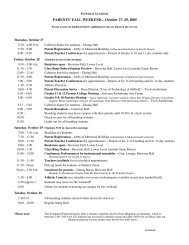SL]FFIELD ACADEMY - Suffield Academy
SL]FFIELD ACADEMY - Suffield Academy
SL]FFIELD ACADEMY - Suffield Academy
Create successful ePaper yourself
Turn your PDF publications into a flip-book with our unique Google optimized e-Paper software.
IMPORTANT INFORMATION ABOUT INFLIJENZA AND INFLTJENZA VACCINE<br />
Please read this carefully!<br />
What is Influenza ("Flu")?<br />
Influenza (or "flu") is a viral infection of the nose,<br />
throat, bronchial tubes and lungs that can make someone<br />
of any age ill. Usually the flu occurs in the United States<br />
from about November to April. If you get the flu, you<br />
usually have fever, chills, cough and soreness and aching<br />
in your back, arms and legs. Although most people are<br />
ill for only a few days, some persons have a much more<br />
serious illness and may need to go to the hospital. On<br />
average, thousands of people die each year in the United<br />
States from the flu or related complications.<br />
Who Should Get Influenza Vaccine?<br />
Because influenza is usually not life threatening in<br />
healthy individuals and most people recover fully, health<br />
officials emphasize the use of vaccine for persons who<br />
are at increased risk of complications from this illness.<br />
Persons who are at an increased risk of complications<br />
who should receive the influenza vaccine include:<br />
. children and adults with severe asthma, heart<br />
disease, diabetes, cystic fibrosis, kidney disease or<br />
anemia which has required regular visits to the<br />
doctor or hospitalization<br />
. children and adults who have a type of cancer or<br />
immunological disorder that lowers the body's<br />
normal resistance to infections<br />
. children and teenagers on long-term treatment with<br />
aspirin who, if they catch the flu, may be at risk of<br />
getting Reye's syndrome (a childhood disease that<br />
causes coma, liver damage and death)<br />
. residents of institutions housing patients of any age<br />
who have serious long-term health problems<br />
In addition, any person wishing to reduce their<br />
chances of getting the flu may choose to receive a flu<br />
shot, including:<br />
. students or other persons in schools and<br />
colleges, if a flu outbreak would cause major<br />
disruptions of school activities<br />
. persons traveling to the tropics at any time of the<br />
year or to countries to the south of the equator during<br />
April-September<br />
Influenza Vaccine<br />
Only a single flu shot is needed each season for<br />
persons 9 years of age and older, but children 8 years of<br />
age or younger may need a second shot after a month.<br />
Children less than 13 years old should be given only<br />
vaccine that has been chemically treated during<br />
manufacture (split virus) to reduce the chances of any<br />
side effects. Split-virus vaccines can also be used by<br />
adults.<br />
Possible Side Effects from the Vaccine<br />
Most people have no side effects from recent<br />
influenza vaccines. Flu shots are given by injection,<br />
usually into a muscle of the upper arm. This may cause<br />
soreness for a day or two at the injection site and<br />
occasionally may also cause a fever or achiness for one<br />
or two days. Unlike the 1976 swine flu vaccine, recent<br />
flu shots have not been clearly linked to the paralytic<br />
illness Guillain-Barr syndrome (GBS). In 1990-91 there<br />
may have been a small increase in GBS cases in<br />
vaccinated persons 18 to 64 years of age, but not in those<br />
under 18 or those over 65. This possible association with<br />
GBS was not as convincing as with the swine flu<br />
vaccine. Even if GBS was a true side effect, the very low<br />
estimated risk of getting GBS is less than that of getting<br />
severe influenza that would be prevented by the vaccine.<br />
As is the case with most drugs or vaccines, there is a<br />
possibility that allergic or more serious reaction, or even<br />
death, could occur with the flu shot.<br />
People who Should Check with a Doctor Before<br />
Taking Influenza Yaccine<br />
. Persons with an allergy to eggs that causes a<br />
dangerous reaction if they eat eggs and those who<br />
have had a serious reaction to previous influenza<br />
vaccination should consult a physician before<br />
receiving the vaccine.<br />
. Anyone who has ever been paralyzed with<br />
Guillain-Barr syndrome should seek advice from<br />
their doctor about special risks that might exist in<br />
their cases.<br />
. Women who are or might be pregnant should<br />
consult with their doctor.<br />
. Persons who are ill and have a fever should ask<br />
their doctor whether or not they should delay<br />
vaccination until the fever and other temporary<br />
symptoms have gone.<br />
Questions<br />
If you have any questions about influenza or<br />
influenza vaccination, please call us at the Health Center<br />
or call your child's doctor before signing this form.


![SL]FFIELD ACADEMY - Suffield Academy](https://img.yumpu.com/26885206/11/500x640/slffield-academy-suffield-academy.jpg)













